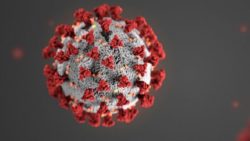 The Intercept prints a Dispatch from an American Nurse on the Frontlines of the Effort to Contain Coronavirus about how one somewhat rural hospital in a chain of (for profit?) hospitals prepared for Coronavirus.
The Intercept prints a Dispatch from an American Nurse on the Frontlines of the Effort to Contain Coronavirus about how one somewhat rural hospital in a chain of (for profit?) hospitals prepared for Coronavirus.
TL/DR: Not at all, then badly.
 The Intercept prints a Dispatch from an American Nurse on the Frontlines of the Effort to Contain Coronavirus about how one somewhat rural hospital in a chain of (for profit?) hospitals prepared for Coronavirus.
The Intercept prints a Dispatch from an American Nurse on the Frontlines of the Effort to Contain Coronavirus about how one somewhat rural hospital in a chain of (for profit?) hospitals prepared for Coronavirus.
TL/DR: Not at all, then badly.
I assume everyone has seen this by now, but if you happen to have missed it, enjoy — to the extent it’s possible to enjoy anything about this administration.
The title is off-putting, Cryptic transmission of novel coronavirus revealed by genomic epidemiology but it’s actually quite readable, and has a lot of interesting information about what genetic sequencing tells us about the spread of the virus.
Four takeaways:
- Practicing social distancing, such as limiting attendance at events with large groups of people
- Working from home, if your job and employer allows it
- Staying home if you are feeling ill
- Take your temperature daily, if you develop a fever, self-isolate and call your doctor
- Implementing good hand washing practices – it is extremely important to wash hands regularly
- Covering coughs and sneezes in your elbow or tissue
- Avoiding touching your eyes, nose, and mouth with unwashed hands
- Disinfecting frequently touched surfaces, such as doorknobs
- Beginning some preparations in anticipation of social distancing or supply chain shortages, such as ensuring you have sufficient supplies of prescription medicines and ensuring you have about a 2 week supply of food and other necessary household goods.
- With these preparation in mind, it is important to not panic buy. Panic buying unnecessarily increases strain on supply chains and can make it difficult to ensure that everyone is able to get supplies that they nee